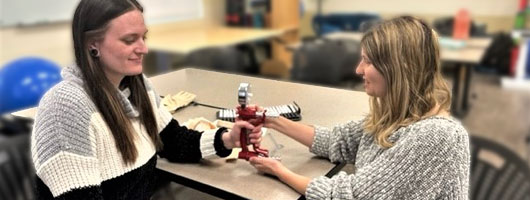 Pictured | (l-r) Brittin Thomas | Master of Science in Occupational Therapy | Bachelor of Science in Education, Special Education, IU South Bend | Mishawaka, Indiana (hometown)
Pictured | (l-r) Brittin Thomas | Master of Science in Occupational Therapy | Bachelor of Science in Education, Special Education, IU South Bend | Mishawaka, Indiana (hometown)
Kristine Magorien | Master of Science in Occupational Therapy | Bachelor of Science in Kinesiology, California State University–East Bay | Camarillo, California (hometown)
Photo provided by the Vera Z. Dwyer College of Health Sciences
Degree Requirements
- Graduate occupational therapy students will take seven consecutive semesters (including two summers) to complete the degree requirements.
- Prerequisite coursework must be completed prior to admission.
- All courses are 3 credit hours, unless otherwise noted
Prerequisites
The program does not have a preference as to the major or concentration of the applicant’s bachelor’s degree; however, all listed prerequisite courses are required.
- Introduction to Psychology (1 semester)
- Abnormal Psychology or Psychopathology (1 semester)
- Life Span/Human Development Psychology (Lifespan/Human development psychology course must include entire lifespan from birth to death; multiple courses may be required.
- Introductory Sociology or Introductory Anthropology (1 semester)
- Statistics (must include descriptive and inferential statistics) (1 semester)
- Human Anatomy with lab (1 semester)
- Human Physiology with lab (1 semester)
- Medical Terminology (minimum 1 credit hour)
- All prerequisite courses must be completed not more than seven years prior to application deadline
- ALL prerequisite courses must be a minimum of 3 credit hours (with the exception of Medical Terminology, which is a minimum of 1 credit hour).
- Course work must be complete with a final course grade of "C" or higher.
Required Coursework
- OCTH-G 540 Introduction to Occupational Science and Therapy
- OCTH-G 546 Occupational Analysis and Environmental Assessment and Design in OT (2 cr.)
- OCTH-G 548 Core Skills and Documentation in Professional Practice in Occupational Therapy (2 cr.)
- OCTH-G 550 Group Process in Occupational Therapy (2 cr.)
- OCTH-G 551 Rehabilitation in Occupational Therapy Practice
- OCTH-G 554 Mental Health and Functional Cognition in Occupational Therapy
- OCTH-G 555 Hand and UE Rehabilitation in Occupational Therapy (4 cr.)
- OCTH-G 556 Population and Individual Health and Wellness in Occupational Therapy
- OCTH-G 565 Research Methods in Occupational Therapy (2 cr.)
- OCTH-G 569 Leadership and Professional Advocacy in Occupational Therapy
- OCTH-G 573 Applied Kinesiology in Occupational Therapy
- OCTH-G 576 Pathophysiology in Occupational Therapy (2 cr.)
- OCTH-G 577 Neuroscience in Occupational Therapy
- OCTH-G 641 Adaptation and Participation in Occupational Therapy
- OCTH-G 647 Health Planning and Evidence-Based Planning in Occupational Therapy
- OCTH-G 652 Occupational Therapy with Young Children
- OCTH-G 653 Occupational Therapy with Children and Youth
- OCTH-G 654 Occupational Therapy with Older Adults
- OCTH-G 655 Assistive Technology in Occupational Therapy
- OCTH-G 664 Management and Entrepreneurship in Occupational Therapy
- OCTH-G 665 Methods of Service Delivery in Occupational Therapy
- OCTH-G 761 Ethics and Professionalism in Occupational Therapy (2 cr.)
Fieldwork Curriculum
In addition to successful completion of the didactic coursework, students must successfully complete the following clinical fieldwork courses. Fieldwork placement is a complex process and a shared responsibility between the Academic Fieldwork Coordinator and the student.
Further details regarding fieldwork is available in the program handbook.
- OCTH-G 592 Fieldwork Models and Level I Psychosocial Fieldwork in Occupational Therapy (2 cr.)
- OCTH-G 692 Level I Fieldwork (Pediatric) (1 cr.)
- OCTH-G 693 Level I Fieldwork (Adult) (1 cr.)
- OCTH-G 699 Level II Fieldwork A (5 cr.)
- OCTH-G 799 Level II Fieldwork B (5 cr.)